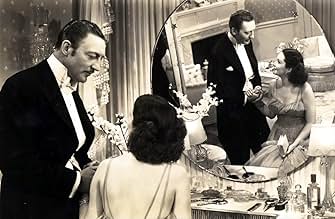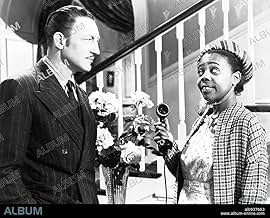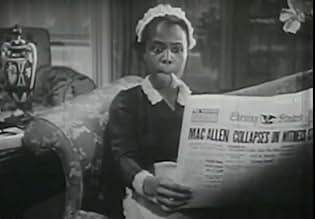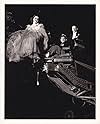A prosecutor trying a case where a husband shot his adulterous wife begins to suspect that his own wife is having an affair, and starts to have his own thoughts about killing her.A prosecutor trying a case where a husband shot his adulterous wife begins to suspect that his own wife is having an affair, and starts to have his own thoughts about killing her.A prosecutor trying a case where a husband shot his adulterous wife begins to suspect that his own wife is having an affair, and starts to have his own thoughts about killing her.
- Director
- Writers
- Stars
Mark Daniels
- Reporter
- (uncredited)
Matty Fain
- Joseph Patterson
- (uncredited)
James Flavin
- Jenks
- (uncredited)
Jack Gardner
- Reporter
- (uncredited)
William Gould
- Prison Warden
- (uncredited)
John Harmon
- Gangster Hitman
- (uncredited)
Grace Hayle
- Lady in Courtroom
- (uncredited)
J. Anthony Hughes
- Murphy
- (uncredited)
- Director
- Writers
- All cast & crew
- Production, box office & more at IMDbPro
6.1628
1
2
3
4
5
6
7
8
9
10
Featured reviews
When Murder was Still a Gentleman's Game
This is a truly original story. Granted, it was done in 1938, but I haven't seen anything quite like it since. That's unusual for Hollywood.
Warren Williams is an obsessed District Attorney who is incapable of any human feeling toward the people he prosecutes. And then a case comes along. A refined, educated, teacher kills his wife in a moment of mad jealousy. Warren has no mercy for him. Coaxes him into a confession with the ultimate goal of executing him.
The gimmick in this story is that, during the trial, he realizes that he is living a parallel life. He has neglected his own wife and come to believe that she is having an affair. After following her to a friends house, he finds himself with a pistol in his hand - a perfect parallel to the case he is trying. It changes his life.
Warren Williams has a tendency to overact, but to hear him bellow in the courtroom, and cackle with glee when he pulls one over on his adversaries, is not to be missed. There is one caution. Is it possible to be too sophisticated? All the other actors are unremarkable, with the exception of Lillian Yarbo who plays the maid. Her lines and expressions are priceless.
If, like me, you long for the days when Hollywood took the time to actually write a coherent script. A time when dialogue really meant something. A time when you second guessed the story and paid attention to the actors - instead of the special effects, take time out for this one. If you can find it.
Warren Williams is an obsessed District Attorney who is incapable of any human feeling toward the people he prosecutes. And then a case comes along. A refined, educated, teacher kills his wife in a moment of mad jealousy. Warren has no mercy for him. Coaxes him into a confession with the ultimate goal of executing him.
The gimmick in this story is that, during the trial, he realizes that he is living a parallel life. He has neglected his own wife and come to believe that she is having an affair. After following her to a friends house, he finds himself with a pistol in his hand - a perfect parallel to the case he is trying. It changes his life.
Warren Williams has a tendency to overact, but to hear him bellow in the courtroom, and cackle with glee when he pulls one over on his adversaries, is not to be missed. There is one caution. Is it possible to be too sophisticated? All the other actors are unremarkable, with the exception of Lillian Yarbo who plays the maid. Her lines and expressions are priceless.
If, like me, you long for the days when Hollywood took the time to actually write a coherent script. A time when dialogue really meant something. A time when you second guessed the story and paid attention to the actors - instead of the special effects, take time out for this one. If you can find it.
WIVES UNDER SUSPICION (James Whale, 1938) **1/2
While this film doesn't seem to have impressed Michael much, I found it somewhat better than SINNERS IN PARADISE (1938) though, obviously, not quite in the same league as Whale's irreproachable horror output.
The film's plot, though essentially contrived, makes for a very interesting melodrama: actually, this was a remake of the same director's THE KISS BEFORE THE MIRROR (1933) and the only review I could find called it "tame and uninspired" when compared to the "more visually striking" Pre-Code original (that was apparently shot on leftover sets from Whale's own FRANKENSTEIN [1931]!) - all of which makes me want to watch the 1933 film even more...
Despite its 'B' picture status, however, the film is stylishly handled by a master craftsman (right from the opening credit sequence) with special care given to camera-work, lighting and décor - not to mention the recurring use of montages; in fact, the latter sequences - along with the hectic pace and the theme itself - recalled some of the social conscience films being made contemporaneously by Warner Bros.! Warren William and Ralph Morgan give solid performances and their scenes together - particularly the latter's confession and the subsequent trial - are certainly among the film's highlights. Unfortunately, however, as was the case with the blackface scene from Whale's own REMEMBER LAST NIGHT? (1935), the film's stereotyped depiction of William's black maid would, most probably, not go down well with today's audiences!
While I never really understood why certain directors needed to remake their own films, I'm certainly glad it happened in this case - particularly since the original doesn't seem to be readily available (a regrettable situation with regards to most of Whale's non-horror titles!), but also because his second stab at the story has certainly made for a pretty good film in its own right.
The film's plot, though essentially contrived, makes for a very interesting melodrama: actually, this was a remake of the same director's THE KISS BEFORE THE MIRROR (1933) and the only review I could find called it "tame and uninspired" when compared to the "more visually striking" Pre-Code original (that was apparently shot on leftover sets from Whale's own FRANKENSTEIN [1931]!) - all of which makes me want to watch the 1933 film even more...
Despite its 'B' picture status, however, the film is stylishly handled by a master craftsman (right from the opening credit sequence) with special care given to camera-work, lighting and décor - not to mention the recurring use of montages; in fact, the latter sequences - along with the hectic pace and the theme itself - recalled some of the social conscience films being made contemporaneously by Warner Bros.! Warren William and Ralph Morgan give solid performances and their scenes together - particularly the latter's confession and the subsequent trial - are certainly among the film's highlights. Unfortunately, however, as was the case with the blackface scene from Whale's own REMEMBER LAST NIGHT? (1935), the film's stereotyped depiction of William's black maid would, most probably, not go down well with today's audiences!
While I never really understood why certain directors needed to remake their own films, I'm certainly glad it happened in this case - particularly since the original doesn't seem to be readily available (a regrettable situation with regards to most of Whale's non-horror titles!), but also because his second stab at the story has certainly made for a pretty good film in its own right.
Anything but an original story
Walter Huston famously said that he wasn't paid to sell good lines, but to put across bad ones. He often did. So did Warren William. For both of them, putting across bad lines frequently involved overacting. It's a bit difficult to believe WW being overcome by passion of any sort, and especially any aroused by his boring (though gracious) clothes-horse of a wife (Gail Patrick) in "Wives Under Suspicion," the tame and uninspired 1939 remake by James Whale of his more visually striking "Kiss Before the Mirror" made only five years earlier, but, presumably, too risqué to be rereleased after the Motion Picture Production Code began to be enforced.
Frank Morgan switched roles from defense attorney in the first to defendant in this one, and, unfortunately, Gloria Stuart and Walter Pidgeon did not return. The story is mechanical and has coincidences that strain credulity, but Warren William gave it his all. The only interesting touch was the courtroom set with the judge raised to an exaggerated height.
Frank Morgan switched roles from defense attorney in the first to defendant in this one, and, unfortunately, Gloria Stuart and Walter Pidgeon did not return. The story is mechanical and has coincidences that strain credulity, but Warren William gave it his all. The only interesting touch was the courtroom set with the judge raised to an exaggerated height.
Tepid, Despite Many Good Moments
I tuned in to catch that great patrician actor from the early 30's, Warren William. A commanding presence in every respect, too bad he's become so obscure. I expect his early death, 1948, has something to do with it. Then too, his best films-- Employees Entrance (1933), Skyscaper Souls (1932), Three On A Match (1932) -- were all pre-Code and as a result never turned up on censored TV for decades. Now, thanks to cable, they're run on outlets like TCM. So be sure to catch them if you haven't already.
Anyway, this programmer from Universal has a good premise, the humanizing of an egotistical DA (William), who counts his capital-case wins on an abacus that uses miniature skulls as a counter. Worse, he's sorely neglecting his patient wife (Jackson) who's slowly running out of patience, but he's too self-absorbed to care. But then the McAllen case comes across his desk and the ironies with his own life begin to intrude. Will his self-enclosed bubble now be enough.
Overall, the results are rather tepid despite the promising elements. Ten years later and the film would likely have gotten a noir treatment. Here, mood is largely missing, while suspense is slow to build, but does have one good unpredictable showdown scene that had me guessing wrong. Truth be told, I'm afraid many lesser performers could have handled the DA role, it not being one of William's showcases. In short, the DA is one of the typically conventional roles he was reduced to during the Code era. Also, the ethnic humor from the Butterfly McQueen-type maid reminds us that it's only a movie, after all.
Overall, there are gripping moments; however, the 70-minutes fails to come together in strong fashion despite the many promising elements. Too bad.
(In passing-- old time TV fans may recognize Milburn Stone as Doc from the classic western series Gunsmoke, along with Gail Patrick (Jackson) who successfully produced the prodigiously demanding Perry Mason series with Raymond Burr.)
Anyway, this programmer from Universal has a good premise, the humanizing of an egotistical DA (William), who counts his capital-case wins on an abacus that uses miniature skulls as a counter. Worse, he's sorely neglecting his patient wife (Jackson) who's slowly running out of patience, but he's too self-absorbed to care. But then the McAllen case comes across his desk and the ironies with his own life begin to intrude. Will his self-enclosed bubble now be enough.
Overall, the results are rather tepid despite the promising elements. Ten years later and the film would likely have gotten a noir treatment. Here, mood is largely missing, while suspense is slow to build, but does have one good unpredictable showdown scene that had me guessing wrong. Truth be told, I'm afraid many lesser performers could have handled the DA role, it not being one of William's showcases. In short, the DA is one of the typically conventional roles he was reduced to during the Code era. Also, the ethnic humor from the Butterfly McQueen-type maid reminds us that it's only a movie, after all.
Overall, there are gripping moments; however, the 70-minutes fails to come together in strong fashion despite the many promising elements. Too bad.
(In passing-- old time TV fans may recognize Milburn Stone as Doc from the classic western series Gunsmoke, along with Gail Patrick (Jackson) who successfully produced the prodigiously demanding Perry Mason series with Raymond Burr.)
****** Deja Vu
Pretty interesting programmer which tells its predictable story in under an hour. Good job turned in by all concerned. Warren William is the man-eating prosecutor with great many scalps under his belt and has sent many murderers to the electric chair, until he finds himself in circumstances similar to a case before him. Gail Patrick is his stalwart, neglected wife and Ralph Morgan is a sympathetic suspect.
This was directed by James Whale, made famous as the director of "Frankenstein", and turns in a workman like job here. Milburn Stone is Williams' right hand man and there are several other familiar faces in the cast. It is better than the non-descript title would suggest and is worth your time on a rainy day, which is when I saw it.
6/10 - Website no longer prints my star ratings.
This was directed by James Whale, made famous as the director of "Frankenstein", and turns in a workman like job here. Milburn Stone is Williams' right hand man and there are several other familiar faces in the cast. It is better than the non-descript title would suggest and is worth your time on a rainy day, which is when I saw it.
6/10 - Website no longer prints my star ratings.
Did you know
- TriviaOriginally titled "Suspicion."
- GoofsWhen Lucy Stowell walks over to the telephone to take a call, she throws the newspaper down on the floor in disgust, and it lands about a foot away from the edge of the rug. She leaves the newspaper there and goes upstairs. When her husband enters the house the next minute, the newspaper is now positioned at the edge of the rug.
- ConnectionsEdited into Haunted Hollywood: Wives Under Suspicion (2016)
Details
Box office
- Budget
- $250,000 (estimated)
- Runtime
- 1h 9m(69 min)
- Color
- Aspect ratio
- 1.37 : 1
Contribute to this page
Suggest an edit or add missing content




































